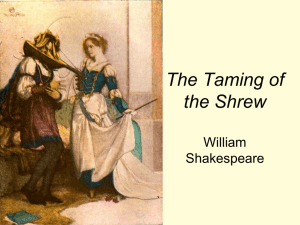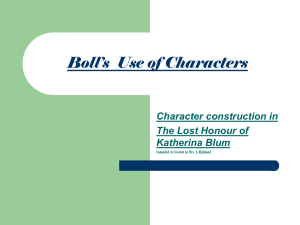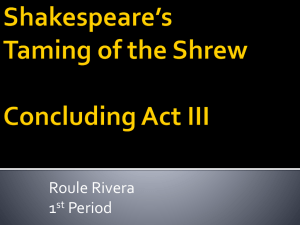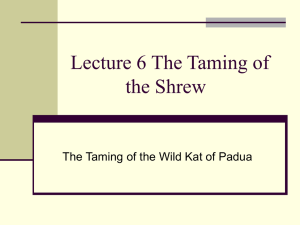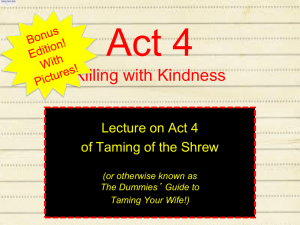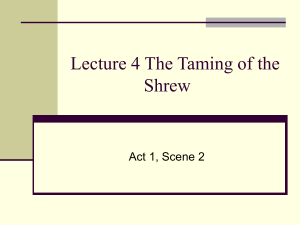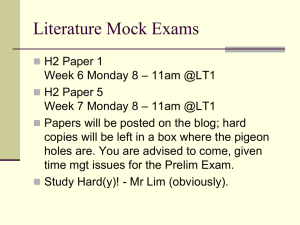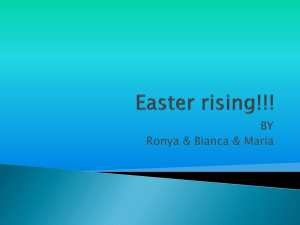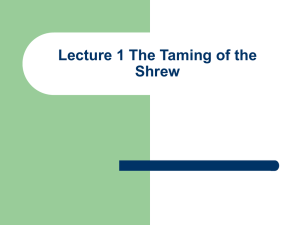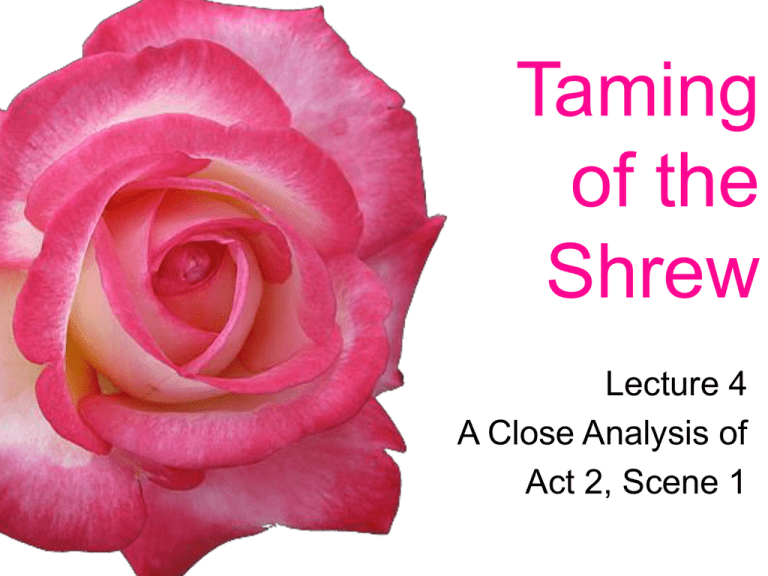
Taming
of the
Shrew
Lecture 4
A Close Analysis of
Act 2, Scene 1
Agenda
• Plot Overview: Act 2 Scene 1
• Issues, Concerns & Concepts
– Structure of Act 2
– Two Sisters: character development
– The Broken Lute: function of
Hortensio’s commentary
– Baptista & Daughters: family
dynamics
– The Marriage Market:
commodification of women
– Verbal Duel
Act 2 Scene 1
Plot Overview
- Bianca + Katherina: Physical Tussle
- Enter Baptista: Father-Daughter relationship, Family dynamics
- Exit Bianca + Katherina
- Baptista + Gremio + Petruchio + Tranio + Biondello
- Hortensio enters with lute over his head
- Exit all but Petruchio
- Enter Katherina
- Katherina + Petruchio: verbal duel
- Enter Baptista: deal is sealed
- Enter Gremio, Tranio: wagering for Bianca
- Exit all but Tranio who closes the Act
Issues, Concepts &
Concerns
- Only Act in the play that has only one scene
- Only Act that opens with two female characters: Bianca and
Katherina
- Characterisation of Bianca and Katherina: function as foils for
each other
- Silence of Bianca;
Expected behaviour of women, of daughters
- Ambiguous who wields more power: Bianca or Katherina
-
Issues,
Concepts
&
Baptista’s father-daughter relationship and his role and
function as the patriarchal head of the family
Concerns
- Family relationships and power dynamics
- Marriage as a Market; Commodification of womanhood and
wifehood;
- Characterization of Petruchio
- Power dynamics re- presentation of Petruchio-Katherina
relationship
- Naming and Identity
- Battle of the Sexes motif
~~~~~~~~~~~~~~~~~~~~~~~~~~~~~~~~~~~~~~~~~~~~~~~
~~~~
In your tutorials, you’ll need to —
Analyze dramatic devices employed to raise all of the above
concerns
Structure of Act 2
• An Act that comprises a single scene: a very lengthy scene with
intense dramatic action and multiple entrances and exits.
• Length is appropriate for comedy, no change in setting
necessitates action being enclosed in a single scene.
• Staging of one long act with no change of scene setting permits
action to take place rapidly – this quick pace reflects the flimflam
style behind Petrchuo’s courtship of Kate
Structure of Act 2
• Only Act that opens with two female characters: Bianca and
Katherina
• Act opens with a little vignette between Katherina & Bianca +
women’s argument transfers the action from a public to domestic
space
• Stark contrast between preceding scene and this scene where
women are now at the forefront, caught in an argument,
reinforcing visually how the male characters value each sister as
women and potential wives
Structure of Act 2
• Noting also the manner in which this scene closes:
• Tranio’s use of soliloquy (instead of dialogue) to work through the
problem of finding a father (a ‘suppos’d Vincentio’) to back up the
promises he has made
• Dramatic Effect / Theatrical Effect?
• Enhances an audience’s sense of connectedness to Tranio
• His solution is framed in terms of a paradox—
• Instead of a father begetting a son, here, the son must beget the
father – this implied possibility of increased farcial confusion,
thus adding to this scene’s comical effects in performance.
Two Sisters
• Opening scene of Act 2 develops the personalities of the two
sisters in greater depth
• Note Stage directions:
Padua: Baptista’s house. Enter Katherina and
Bianca with her hands tied
• Katherina has bound Bianca’s hands and is questioning her
sister forcibly
• Stage directions are also implicitly built into the dialogue:
Bianca’s repeated request to Katherina to “unbind/untie my
hands”
Two Sisters
• A closer reading / viewing reveals at least two matters:
1. Bianca is aware she possesses something that
Katherina does not have
2. Bianca is also of the impression that Katherina has reason to
envy her
• Power of the younger sister to provide what she presumes the
other lacks therefore reverses the power dynamics of their
relationship;
• Katherina is frustrated by Bianca’s silence: therein lies the irony
for it is Bianca who disobeys her husband at the end of the play
The Broken Lute
• Hortensio’s spirited account of Katherina’s music lesson
• The advantage of relating this encounter through the distancing
strategy of a storytelling device who walks in with a lute over his
head rather than by presenting it first hand on stage is that it:
– 1. Complicates the layers of perspective
– 2. Allows a theater audience to simultaneously register the slapstick
action of Kate smashing the lute over her tutor’s head
– 3. Replicates visually the image summoned up by his words
– 4. Delays dramatically Petruchio’s first introduction to Katherina,
making audience anticipate their impending meeting even more
eagerly (effect)
Baptista & Daughters
• Baptista enters when Katherina is questioning Bianca: His pity for
his youngest daughter moves him to command Katherina to
move away
• Note his dialogue and his blunt estimation of Katherina:
“For shame, thou hiding of a devilish spirit” 2.1.26
• Family dynamics:
Could Baptista’s partiality and favouritsm, parental cruelty or
neglect be the cause of Katherina’s disruptive and attention
seeking behaviour?
Baptista & Daughters
• One may infer that Katherina’s non-conformist nature has made
her father favour Bianca over Katherina
• Might not this then be the basis for Petruchio’s tough stance and
strategic approach to shrew taming, yet suitably distanced from
physical and ideological brutality?
• Thus ironically presenting Katherina with the means by which
she is empowered to escape both her family and the selfdestructive defensive mechanisms on which she has learned to
depend?
The Marriage Market
• In this Act, there is repeated reference to marriage as a market,
where goods are sold and bought
• Petruchio brushes aside the niceties of courtship to focus on
money and finances remain at the heart of marriage
negotiations—
“Signor Baptista, my business
asketh haste,/ And everyday I cannot come to woo.” 2.1.113
• Baptista: “After my death, the one half of my lands,/ And in
possession twenty thousand crowns.” 2.1.120.
• 20,000 crowns = 500 pounds. (best alebrewers and cooks
earned 6 pounds a year)
The Marriage Market
• Baptista “Faith, gentlemen, now I play a merchant’s part,/
And venture madly on a deperate mart.” 2.1.318. He uses a
mercantile metaphor to draw out his own financial interest in
Bianca’s marriage, as a merchant undertaking a high-risk
enterprise .
• Tranio responds in a business-like manner and it is implicit in his
comment that women as commodities have a sell-by date and
Baptista might as well risk a bad venture. “Twas a commodity
lay fretting by you/ Twill bring you gain, or perish on the
seas.” 2.1.320. There is a direct reference to women as
commodities for sale.
The Marriage Market
• Is there a contrast between how the marriages between the two
sisters are negotiated?
• A stark contrast
• Katherina’s marriage arrangements are sharply contrasted by the
way Bianca’s marriage is negotiated. The suitors are to pay or to
declare their wealth before they can marry Bianca.
• Why? Perhaps Bianca, because her ideal femininity is dowry
enough. And that a competitive number of suitors has rendered
her dowry non-negotiable
The Marriage Market
• Dramatic Effect of Tranio negotiating for the hand of Bianca on
behalf of Lucentio?
• Distances the latter from business aspects of marriage
• And this sustains the illusion that Bianca and suitor marry for
romantic love instead of Petruchio’s main interest – money
The Marriage Market
• Petruchio cuts short his verbal sporting match when he
announces that whether Katherina likes it or not, her father has
already agreed to their marriage.
• Polemic tracts in late 16th C emphasize the importance of
compatibility and even love between husband and wife,
but
• children of noble families remained restricted in their choices of
spouses – women having less choice naturally.
• Still, here it is evident that Petruchio wields linguistic power
and decides when their verbal tennis match ceases
“Good morrow,
Kate, for that’s
your name, I hear,”
Verbal Duel
• “Good morrow, Kate, for that’s your name, I hear,” 2.1.181
Petruchio assumes a familiarity that Katherina immediately
challenges. We hear the name Kate, conventionally only used
within a family context (Bianca and Baptista).
• Here, Petruchio uses repetition, alliteration, amplification and
heavy metrical emphasis.
• And also through comical irony to elevate the diminutive form of
her name to the stature of a title (Kate of Kate Hall)
Verbal Duel
• Word-play (Punning / Paronomasia) used as both noun (a choice
delicacy), and as an adjective (both valuable and overly
scrupulous) = ‘super-dainty Kate’ / ‘For dainties are all Kates’;
• Effect?
• Through this, Petruchio at once praises her worth and ridicules
her imperious behaviour
• Early clash about names and naming also foreshadows SunMoon Scene (4.5) and the unique way Petruchio displays his
absolute linguistic power within their marriage
• The concept of naming and identity figures largely in these
lines
• Also, animal imagery abound in their verbal battle
Verbal Duel
• This is essentially an extended dialogue sequence of
stichomythia (a rapid and highly stylized verbal exchange in
which a one- or two-line even half-line speech from one
character is balanced and so exactly countered by a riposte from
his or her opponent)
• Dramatic Effect?
• This creates a dramatic effect of emotional intensity and
intimacy at the very moment the characters are engaged in a
combat of words
Verbal Duel
• Audience is able to empathize with Katherina’s growing
frustration and exasperation with Petruchio’s treatment of her
during their marriage
• Competitive style of dialogue reproduces the physicality and
muscular energy of improvised performance as spectators mark
how each rejoinder becomes in turn the raw material out of which
the next rejoinder is constructed
• Excitement of this style of drama in performance results from
virtuoso display of fast-paced wordplay and bawdy innuendo
AND also from an anticipation that at some point this
repartee will collapse
Verbal Duel
Petruchio’s Weapon
• Language as a weapon in this early tussle for power; to
disempower Katherina; used as a weapon to break down normal
communication
• Petruchio disempowers her ability to communicate by taking
what she says that is hostile in contrary sense.
• Tactic is foreshadowed by his paradoxical description of her as
‘bashful’ and ‘mild’ 1.160-2
• Language transformed into a weapon of anger and conflict –
disempowering from the outset her ability to communicate at all.
• Everything she says that is hostile in tone or context, he will
strategically take it in its contrary sense.
A closer look...
• Repartee does break down at least at two points:
• First, when Katherina is shocked into silence with Petruchio’s
oral sex pun on tale/tail. She then resorts to physical violence.
• Note the stage direction < She strikes him >, Petruchio then
threatens to cuff her and this once again sparks off the verbal
jousting, revealing her continued hostility and defiance, although
she recognizes that in hitting Petruchio, she has overstepped the
rules of the game and is indeed in potential physical danger.
• Second time repartee breaks down is when it is implicit in
Katherina’s lines that she is struggling in Petruchio’s arms “I
chafe you if I tarry. Let me go.” 2.1.243
Questions
Why does Katherina not object
violently to their marriage?
Between Bianca and Katherina, who
appears to possess a more shrewish
nature in this Act?
Why is this Act critically significant to
your understanding of the play in its
entirety?
Let the Battle of the Sexes Begin!
KATHERINA
PETRUCHIO

